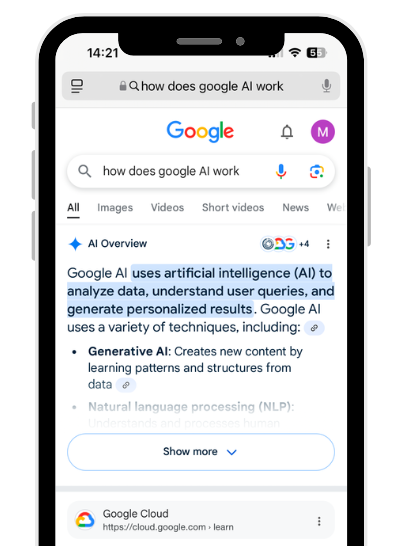By Pranit Mesvania – Paid media manager
With AI being the current buzzword in the marketing world and the general public alike, its role within the digital space is firmly here to stay as the landscape rapidly evolves. Many people are now becoming familiar with and have experience of how AI has integrated into our everyday lives, such as when conducting online shopping with personalised recommendations, digital personal assistants, smartphones and even smart thermostats.
On a bigger scale, artificial intelligence can be found in cars, manufacturing with the use of robots and cybersecurity systems. We’ve even seen it used in the fight against disinformation with certain AI applications able to detect fake news by mining social media information which looks for words that are sensational or alarming and identifying which online sources are deemed authoritative.

This update brings AI-generated overviews summarising information from multiple sources, aiming to give users a quicker and more comprehensive understanding of their queries. However, as some would expect when new features are introduced by big tech companies, issues became apparent early on when the AI overview began relaying ‘erratic and inaccurate information’, as reported in this BBC article.
In the world of pay-per-click (PPC) marketing, advertisers have slowly been introduced to new features and time-saving processes which otherwise would have taken longer during or before AI’s formative years. Google Ads, one of the most popular PPC platforms, is leading this transformation by incorporating AI-driven tools and algorithms designed to optimise campaigns, save time, and improve performance.
Here we explore the cutting-edge AI and machine learning features in Google Ads, how they are changing the landscape of PPC management, and what advertisers can expect in the near future.
Firstly, let’s quickly go over the main differences between AI and machine learning:
- Artificial intelligence (AI) refers to the simulation of human intelligence by machines. It can process large amounts of data, make decisions, and even simulate problem-solving abilities.
- Machine learning (ML) is a subset of AI that focuses on allowing machines to learn from data. Instead of being explicitly programmed, machine learning algorithms improve over time as they are exposed to more data.
Now let’s uncover how AI is making advertising smarter and how machine learning helps drive ongoing improvement in targeting, bidding and ad creation:
Smart Bidding
- One of the most significant AI-driven features in Google Ads is Smart Bidding. This feature uses machine learning to optimise bids for conversions or conversion value across every auction -also known as ‘auction-time bidding’.
- With Smart Bidding, AI automatically adjusts your bids based on various contextual signals such as device, location, time of day, demographics, and more. This makes it easier to achieve your campaign goals without constantly monitoring and adjusting bids manually.
Responsive search ads (RSAs)
- Responsive search ads are powered by machine learning and take ad creation to the next level. Instead of crafting a single ad, advertisers input multiple headlines and descriptions, and AI dynamically tests different combinations to determine the best-performing variations.
- Over time, machine learning optimises the ad combinations to serve the most effective version based on user behaviour and search queries. This reduces the need for constant A/B testing and manual adjustments, allowing businesses to scale their ad campaigns more efficiently.
Performance Max
- Performance Max is an AI-driven campaign type that leverages automation across all of Google’s ad inventory (Search, Display, YouTube, Discover, Gmail, and Maps). It uses machine learning to automatically find and serve the best-performing ad formats and placements based on your objectives.
- AI optimises everything -from creative asset selection to targeting -ensuring that ads reach the right audience at the right time, across multiple channels, all from one unified campaign.
Smart Shopping campaigns
- Smart Shopping campaigns combine standard Shopping campaigns with Display remarketing ads, and AI handles much of the heavy lifting. Machine learning optimises product bids and ad placements based on past data, ensuring that ads are shown to users who are most likely to convert.
- These campaigns work best for E-commerce businesses, as they automatically adjust bids and placements across networks to maximise sales and return on ad spend (ROAS).
Dynamic Search Ads (DSAs)
- Dynamic Search Ads automatically generate ad headlines and landing pages based on your website content. AI scans your website, matches relevant queries with your pages, and dynamically creates ads to show to potential customers.
- DSAs reduce the manual effort of keyword research and ad creation while ensuring that your ads remain relevant as your website content changes.
Benefits of AI and machine learning in PPC management
- Efficiency and time savings
- Improved performance and ROI
- Personalisation at scale
- Real-time adaption
The future of AI in Google Ads
The role of AI in Google Ads is only expected to grow. Future developments could include:
- Enhanced predictive analytics: More advanced AI models could predict customer behaviour with even greater accuracy, helping advertisers anticipate trends and adjust their strategies pre-emptively.
- Greater automation of creative elements: AI may eventually create entire ad campaigns, including imagery and video content, based on brand guidelines and audience insights.
- Voice search integration: As voice search continues to rise, AI will likely play a significant role in optimising campaigns for voice-based queries and even voice-activated ad placements.
- Full-funnel automation: AI could soon manage entire marketing funnels, from prospecting to remarketing, without the need for manual adjustments, making PPC campaigns more efficient and profitable.
Conclusion
AI and machine learning are transforming PPC management in Google Ads by automating bidding, ad creation, and targeting, leading to improved efficiency and performance. While there are challenges like transparency and data dependency, embracing AI-driven tools is essential for staying competitive in the evolving digital marketing landscape. The future of PPC will increasingly rely on these technologies, offering businesses new opportunities for growth and optimisation.





